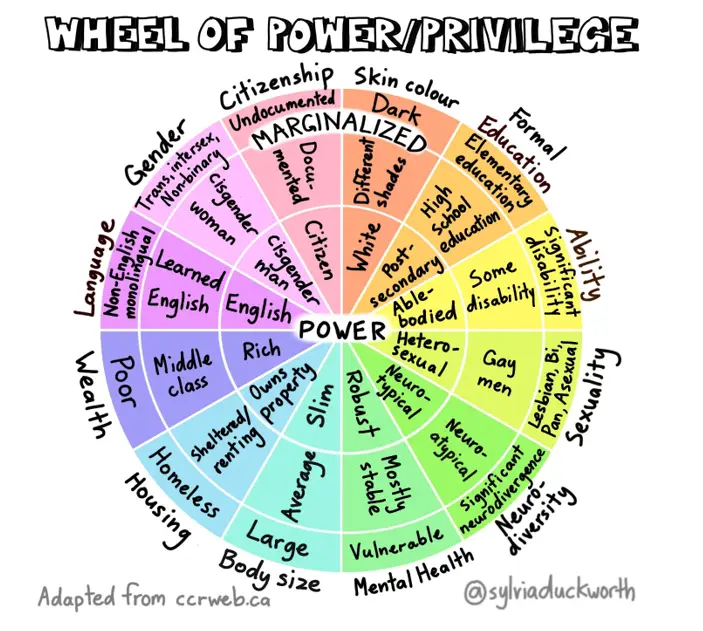Medicine Wheel Systems Theory and Combating Colonial Epistemic Violence

Abstract
The Confluence of Medicine Wheel Systems Theory and General Systems Theory
This paper employs an interdisciplinary approach by amalgamating Medicine Wheel Systems Theory (MWST), rooted in Indigenous cosmologies, with general systems theory, originating from Western scientific traditions. MWST adopts a wholistically-oriented, cyclical perspective that underscores interconnectedness and equilibrium. On the other hand, general systems theory applies a dissectional modality, examining complex systems through the analysis of feedback loops, subsystems, and leverage points. The paper contends that merging these two theories engenders a heuristic lens capable of addressing the systemic sidelining of Indigenous epistemologies in Canadian post-secondary education. While Medicine Wheel Systems Theory inherently opposes the Eurocentric epistemic monopoly, general systems theory furnishes methodological tools that settlers, as architects of the current system, can employ for its deconstruction and reformation.
Disentangling Epistemic Violence in Curriculum Architecture
Epistemic violence is a central concern for me as an Indigenous legal scholar working and teaching in the Canadian post-secondary education system. It can manifest itself as either the outright negation or diminishment of Indigenous ways of knowing. This type of violence is not adventitious but is systemically inscribed within the Eurocentric curriculum, policy, pedagogy, and work/social structures, consequently reinforcing settler-colonial hegemonies.
Utility of the “Epistemic Frameworks” Quadrant in MWST
The “Epistemic Frameworks” quadrant in MWST serves as the keystone for the study’s methodology. It functions as an evaluative template, identifying where and how Indigenous epistemologies are either consciously undermined or inadvertently trivialized. Implementing this quadrant in syllabus development in post secondary can act as a counterforce, serving as a balancing feedback loop to the prevailing loop that reinforces epistemic violence.
The Audit of Feedback Loops and Leverage Points
The study’s methodology encompasses an audit of systemic structures to identify the existence of feedback loops and leverage points. The term ‘audit’ implies an exhaustive, stringent scrutiny, aiming to pinpoint either reinforcing or balancing feedback loops that either exacerbate or alleviate epistemic violence. Leverage points, as focal nodes for systemic modification, are identified and explored as potential instigators for impactful change.
Indigenous Law as the Capstone for Advocacy
This study underscores the centrality of Indigenous law, marking it as the ultimate leverage point for systemic transformation. Grounded in communal consensus and time-honoured traditions, Indigenous law furnishes a solid framework for galvanizing systemic alterations that are both meaningful and enduring across the Canadian institutional and educational landscape.
In summary, this paper posits a dual-theoretical lens—MWST and general systems theory—as instrumental in rectifying epistemic imbalances within the Canadian post-secondary education system. It tackles the structural epistemic violence by auditing feedback loops and leverage points and advocates for systemic change via the operationalization of Indigenous law.
Introduction
The Pervasiveness of Colonial Legacies: Framing the Context
Colonial legacies, not just as historical artifacts but as living systems of domination, imbue numerous societal institutions with epistemological, structural, and procedural biases. Among these institutions, the post secondary education system is paramount, serving as a primary conduit for the transmission of culture, values, and social capital. Within the Canadian context, the education system has historically operated as a principal instrument of colonial policy, aimed at the acculturation and often outright assimilation of Indigenous populations. This assimilative project manifests in various ways, including curriculum design, pedagogical methods, and even administrative structures.
Epistemic Violence: The Marginalization of Indigenous Ways of Knowing
The consequences of this colonial legacy are far-reaching, not least of which is the systematic marginalization of Indigenous epistemologies. These are not mere omissions but rather constitute acts of epistemic violence. Such violence refers to the deliberate and systemic suppression or trivialization of Indigenous ways of knowing, thus affirming the hegemony of Western thought. It operates at both macro and micro levels, shaping the curriculum and influencing professor-student; leadership-professor; and everyday workplace interactions, thereby reinforcing colonial narratives and power structures.
Methodological Approaches: Medicine Wheel Systems Theory and General Systems Theory
To dissect these complex interactions and systemic failings, this paper will employ an interdisciplinary approach that synthesizes the Medicine Wheel Systems Theory (MWST) with general systems theory. The MWST provides a framework rooted in Indigenous worldviews that encompass not just epistemological aspects but also elements of governance, economy, and social cohesion. This aligns closely with systems theory’s emphasis on interconnectedness, feedback loops, and leverage points, offering a rich, multilayered lens to study the institutional factors perpetuating epistemic violence.
The Focus on Epistemic Frameworks Quadrant
The specific focus of this paper will be the “Epistemic Frameworks” quadrant within Medicine Wheel Systems Theory, aimed at identifying and remedying instances of epistemic violence. By investigating how Indigenous epistemologies can be robustly incorporated into post-secondary syllabi, policies, and workplaces practises, this paper will propose concrete avenues for challenging the prevailing settler colonial pedagogies and decision making strategies.
Medicine Wheel Systems Theory (MWST)
The Medicine Wheel Systems Theory (MWST) emanates from Indigenous intellectual traditions, and as a heuristic device, it endeavours to make legible the intricate relationships and interfaces that comprise all of life and ecosystems. In its construction, the MWST consists of four quadrants, each offering a unique yet interconnected vantage point from which to scrutinize and interpret phenomena:
- Governance Structures: This quadrant focuses on the frameworks and protocols through which authority is wielded and decisions are made, inviting a critical reconsideration of state systems and the colonial imperatives that undergird them.
- Economic Systems: This quadrant goes beyond the mere quantifiable metrics of economy to encapsulate the interplay between ecology, spirituality, and resource distribution, seeking to articulate alternative economic models anchored in Indigenous philosophies.
- Epistemic Frameworks: This quadrant foregrounds the varied systems of knowing and belief that sustain governance and social systems, particularly spotlighting the epistemic violence perpetrated through the marginalization or erasure of Indigenous knowledge systems.
- Social Cohesion and Identity: This quadrant interrogates the processes that cultivate or undermine community identities, delving into colonial legacies that have splintered Indigenous communities.
Systems Theory
Originating from various disciplines including physics, biology, and psychology, Systems Theory serves as a meta-theory that provides tools for understanding the behaviour of complex systems. A key feature of this approach is the emphasis on non-linear relationships, feedback loops, and leverage points:
- Feedback Loops: These refer to the causal pathways that either amplify (reinforcing loops) or balance (balancing loops) certain effects within the system. For instance, the continued marginalization of Indigenous languages in educational curricula could create a reinforcing loop, further diluting the language’s prevalence and cultural import.
- Leverage Points: These are particular components within a system where a small amount of effort can lead to disproportionately large impacts. For instance, integrating Indigenous epistemologies in the post secondary curriculum could serve as a leverage point that precipitates broader systemic change.
The integration of Medicine Wheel Systems Theory and Systems Theory enables an enriched, multi-layered analytical framework. While MWST offers a contextually rooted, culturally sensitive schema for analysis, Systems Theory contributes a set of colonially applicable analytical tools. Together, they permit a nuanced understanding of complex systemic constructs, allowing for the dissection of institutional failings, the identification of epistemic violence, and the provision of pathways for meaningful systemic alterations.
Feedback Loops and Quadrantal Interactions
In the synthesized framework, feedback loops serve as dynamic interconnections between the various quadrants of the Medicine Wheel. A quintessential example would be how economic systems, as delineated in the MWST, interact with governance structures. An imbalanced, exploitative economic system rooted in colonial paradigms can create a reinforcing feedback loop that further entrenches these structures of governance. Alternatively, the activation of Indigenous forms of governance may introduce balancing loops that attenuate colonial influences and bring equilibrium to the economic systems.
Leverage Points in Context
Leverage points in a combined MWST-Systems Theory framework are not merely mechanical nodes for intervention but become imbued with cultural, epistemic, and political significances. For instance, the quadrant of Epistemic Frameworks can serve as a leverage point for reforming post secondary educational systems. Here, a focused effort to integrate Indigenous epistemologies into curricula can trigger a cascade of changes, reaching into the governance and social cohesion quadrants by validating Indigenous knowledge systems at institutional levels.
Systemic Audits and Cultural Affirmation
By employing Systems Theory’s capacity for auditing feedback loops and identifying leverage points, the integrated framework offers a methodological rigor to MWST’s cultural and contextual sensibilities. This allows for a type of systemic audit, wherein reinforcing and balancing loops within colonial systems can be mapped, named, and challenged, thereby exposing sites of epistemic violence or economic exploitation.
Governance Through Indigenous Lenses
This integrated approach opens new vistas for ‘Indigenizing’ systemic constructs. For instance, by examining governance structures through the lens of Indigenous law, traditional community consensus mechanisms could serve as both a feedback loop and a leverage point for fostering more equitable governance structures.
In conclusion, the integration of MWST and Systems Theory facilitates a nuanced and multifaceted approach to systemic analysis. It provides the intellectual scaffolding for a culturally rooted, empirically rigorous interrogation of complex systemic interactions, particularly those marred by colonial imprints and Indigenous marginalization. The synthesis offers a roadmap for not only diagnosing systemic pathologies but also for envisaging and enacting transformational changes.
The Canadian Post Secondary Education System and Indigenous Epistemologies: Identification of Epistemic Violence
The Canadian post secondary education system, a byproduct of colonial imperatives, provides a cogent setting for exploring the intersections between systemic injustices and Indigenous marginalization. While there have been recent initiatives to include Indigenous content in curricula, these efforts often fail to escape tokenistic undertones, thereby perpetuating epistemic violence. Such violence is not merely an incidental oversight; it is a reinforcing feedback loop that serves to delegitimize and erode Indigenous knowledge systems over time.
The Mechanism of Epistemic Violence
Epistemic violence can manifest in various ways, from the complete erasure of Indigenous perspectives to their stereotypical representation in textbooks and teaching materials. When such knowledge is either omitted or trivialized, the message conveyed to Indigenous and non-Indigenous students alike is that these perspectives are less valid or less important than dominant Eurocentric paradigms.
Feedback Loops of Erasure and Trivialization
The feedback loop is crucial for understanding how this epistemic violence is not just an isolated event but part of a self-reinforcing system. For example, the absence of Indigenous epistemologies in curricula can influence academic research priorities, which in turn further marginalizes these epistemologies in future educational content. The cycle is also perpetuated in the professor-student dynamic; the leadership-professor dynamic; and in settler colonial workplace dynamics overall. The leadership, professors, and employees who are products of the same system often lack education to integrate Indigenous perspectives ethically, thereby reinforcing the same epistemic violence with each interaction.
Intersectionality of Epistemic Violence and Systemic Racism
This feedback loop is intricately connected with broader cycles of systemic racism and socio-economic marginalization. The educational system, as a microcosm of the larger societal context, feeds into and draws from these cycles, further entrenching the delegitimization of Indigenous perspectives.
Disrupting the Feedback Loop
Breaking this loop necessitates a systemic overhaul, not mere piecemeal adjustments. Systemic leverage points for change could include a mandatory integration of Indigenous knowledge systems for every leader, professor and employee at the post-secondary institution, which would require collaborative work with local Indigenous elders, matriarchs, youths, scholars, organizations and on-reserve and off-reseve individuals and communities in the area.
In summary, the Canadian education system’s epistemic violence against Indigenous knowledge systems is not merely a passive omission but an active, self-perpetuating mechanism. Understanding this as a feedback loop provides a critical lens for comprehending the resilience of such systemic violence and points the way toward potential sites for substantive, systemic change.
The Quadrant: Epistemic Frameworks – An Instrument for Curricular Reformulation
The “Epistemic Frameworks” quadrant, one of the four main segments of the Medicine Wheel Systems Theory (MWST), functions as an evaluative instrument that locates epistemological zones susceptible to intentional or systemic marginalization of Indigenous knowledge systems. Within this context, the quadrant aids in generating a systematic audit, using both MWST and general systems theory, to discern the functioning of reinforcing and balancing feedback loops and to isolate leverage points in the existing curricular structures.
The Audit as a Methodological Mechanism
The term ‘audit’ in this context is multilayered. It involves a multi-faceted analysis that not only scrutinizes the overt components like content and representation but also delves into covert aspects such as underlying assumptions, ideological stances, and epistemic orientations that the post secondary curriculum propagates. Consequently, the audit identifies not just blatant but also insidious forms of epistemic violence, offering avenues for their remediation through identified leverage points.
Redesigning Post-Secondary Syllabi – An Epistemic Reconstruction
Curricular Content as a Leverage Point
One immediate leverage point to consider is the curriculum content itself. Indigenous perspectives, worldviews, and methodologies can be incorporated into existing courses or can serve as foundations for new courses altogether. This incorporation serves multiple purposes: it brings in the original laws and epistemic paradigms to the land settlers currently occupy and where institutions are settled, thereby broadening the educational scope, and it also rectifies the epistemic imbalance that currently exists.
Challenging Settler Colonial Pedagogies Through Feedback Loops
Balancing and Reinforcing Loops
Integrating Indigenous epistemologies acts as a balancing feedback loop that disrupts the status quo of settler colonial pedagogies. The balancing loop effectively mitigates the reinforcing loop that sustains epistemic violence, thereby reconfiguring the systemic dynamics. This is not a mere addition but an epistemological juxtaposition that challenges the underlying assumptions of the existing pedagogical frameworks.
Destabilization as a Strategy
This intentional destabilization serves to decenter settler colonialism within the academic milieu, making room for plural epistemologies, thereby enriching the educational tapestry and establishing a more equitable learning environment.
In conclusion, the “Epistemic Frameworks” quadrant offers a formidable tool for auditing and reforming post-secondary syllabi and decision making. It does so by identifying and providing means to alter feedback loops and leverage points that perpetuate epistemic violence. Its utility extends beyond mere identification, acting as a catalyst for substantive change by disrupting settler colonial pedagogies and fostering a more inclusive and equitable academic landscape.
Advocacy Through Indigenous Law – A Leverage Point for Systemic Transformation
Indigenous Law as an Epistemological Framework
Indigenous law is not merely a set of rules or statutes but constitutes an entire epistemological framework grounded in Indigenous worldviews. Unlike Western jurisprudence, which often focuses on adversarial conflict resolution and binary ethics, Indigenous law commonly encompasses collective consensus, intergenerational wisdom, and a deeply rooted sense of interconnectedness with the natural world. In this sense, Indigenous law serves as both a reactive and proactive mechanism: it not only addresses conflicts but also shapes behaviour and attitudes in alignment with wholistic principles.
Systemic Transformation Through Legal Leverage Points
The term ‘leverage points’ in systems theory signifies areas within a complex system where a small shift can produce substantial changes. Indigenous law can serve as such a leverage point by introducing alternative, non-colonial methods of decision making, policies, regulations, acts, ethics and overall governance into the existing system. When applied to the post secondary educational system, these methodologies could offer ways to navigate the contentious debates surrounding curriculum changes or the incorporation of Indigenous epistemologies.
Legal Mechanisms for Curriculum Reform
Indigenous legal principles could provide the foundational logic for advocating curriculum reform that respects Indigenous knowledge systems. For instance, the doctrine of “free, prior, and informed consent”, could be instituted in educational policy to ensure that Indigenous communities have a say in how their knowledge and cultural practices are incorporated into post secondary educational content. This could serve as a significant counterpoint to existing policies, which often result in the tokenistic inclusion or misrepresentation of Indigenous cultures and philosophies.
Inter-Institutional Collaboration for Advocacy
The advocacy for this change can occur through collaborative efforts between Indigenous organizations, elders, matriarchs, individuals, youth, scholars, on-reserve and off-reservecommunities, legal experts in Indigenous law, and policy-makers in the educational sector. Such partnerships could produce comprehensive policy frameworks that respect the epistemic diversity and complexity inherent in Canada’s social fabric, thereby bridging existing gaps and mitigating forms of epistemic violence.
Conclusion: The Transformative Potential of Indigenous Law
In conclusion, Indigenous law offers a robust mechanism to alter the systemic structures that sustain the marginalization of Indigenous epistemologies in the Canadian post secondary educational system. It serves as a leverage point that, if properly engaged, can induce a cascade of changes, leading to a more equitable, inclusive, and epistemically diverse educational environment. Leveraging Indigenous law for this purpose not only redresses existing inequities but also aligns the educational system with broader principles of social justice, thereby contributing to its overall integrity and resilience.
Conclusion: Toward a Systems-Oriented Decolonial Strategy in Post Secondary Canadian Education
Synthesizing MWST and Systems Theory
The synthesis of Medicine Wheel Systems Theory (MWST) and general systems theory offers an unprecedented analytical rigor and ethical profundity to the discourse surrounding the Canadian educational system’s treatment of Indigenous epistemologies. By integrating the cyclical, wholistic perspective of MWST with the analytical instruments of systems theory—such as feedback loops and leverage points—we achieve a multi-layered diagnostic tool. This synthesis is not a mere amalgamation but a dialogic process where each framework refines and supplements the other. While MWST challenges the colonial parameters of systems theory, the latter provides the structural means to critique its own systemic manifestations.
The Primacy of the “Epistemic Frameworks” Quadrant
The centrality of the “Epistemic Frameworks” quadrant in this integrative model deserves emphasis. This quadrant serves as a heuristic device that maps the interconnections between epistemic violence, marginalization, and the reinforcement cycles that perpetuate them within post secondary curricula, decision making, ethics, and biased workplace behaviours. By focusing on this quadrant, the methodology for auditing curriculum, decision making, and policy strategies becomes pointedly tailored to confront epistemic exclusions. This targeted approach addresses both overt and insidious forms of erasure, thereby providing a nuanced understanding of how Indigenous perspectives are marginalized.
Indigenous Law as a Transformative Leverage Point
Perhaps one of the most potent findings of this study is the identification of Indigenous law as a transformative leverage point. Situated within a legal-epistemological framework rooted in community, relationality, and collective justice, Indigenous law functions as both a critique of and an alternative to colonial statutory frameworks. Advocacy through Indigenous law transcends mere reformism; it engages in a radical reimagining of what educational justice could signify within a pluralistic, decolonized Canada.
Moving Forward: Epistemic Justice and Systemic Integrity
By employing this integrative tool, the objective is not merely to critique but to reconstruct—an endeavour directed toward both epistemic justice and systemic integrity. The incorporation of Indigenous epistemologies, facilitated through targeted auditing and legal advocacy, serves to not only dismantle existing hegemonies but also to create a more inclusive, resilient, and adaptive educational system.
In summary, this paper posits that the deliberate combination of Medicine Wheel Systems Theory and general systems theory provides a robust and ethically coherent tool for auditing and transforming the Canadian post secondary education system. Through targeted curriculum redesign based on the “Epistemic Frameworks” quadrant and strategic advocacy via Indigenous law, it offers actionable avenues for dismantling systemic barriers and achieving a more inclusive and equitable educational milieu.




